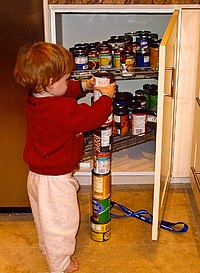
Photo from wikipedia
The majority of people with Autism Spectrum Disorder (ASD) exhibit difficulties in social communication and behavior, which hinder their learning capability, amid others. Among technological solutions for people with ASD,… Click to show full abstract
The majority of people with Autism Spectrum Disorder (ASD) exhibit difficulties in social communication and behavior, which hinder their learning capability, amid others. Among technological solutions for people with ASD, serious games are frequently used to enhance learning of specific skills and instructional contents. However, because of heterogeneity in applications and game design, few studies have investigated their use in training daily activities. This paper presents a 3D personalized serious game we developed and validated to help ASD patients practice with shopping activities. Personalized training is paramount in people with ASD, thus several elements of this game were personalized to improve engagement and therefore the effectiveness of the virtual training. In order to assess the validity of the game, ten subjects (age $\text{11.9} \pm \text{2.7}$, 20% female) with ASD played ten sessions of the serious game, once per week. The participants underwent a real-life experience pre- and post-training in a real-life supermarket. Changes in daily living skills among participants were evaluated through specific tools: a form based on the International Classification of Functioning, Disability and Health for Children and Youth; and the Vineland Adaptive Behavior Scale II. Significant improvements (p$< $0.05) were detected in the main skills trained with the serious game, especially in learning the shopping procedure, directing attention, and problem-solving skills. These findings suggest that personalized serious games can represent a prominent tool to enhance daily living skills, but future work should clinically validate their efficacy.
Journal Title: IEEE Journal of Biomedical and Health Informatics
Year Published: 2022
Link to full text (if available)
Share on Social Media: Sign Up to like & get
recommendations!